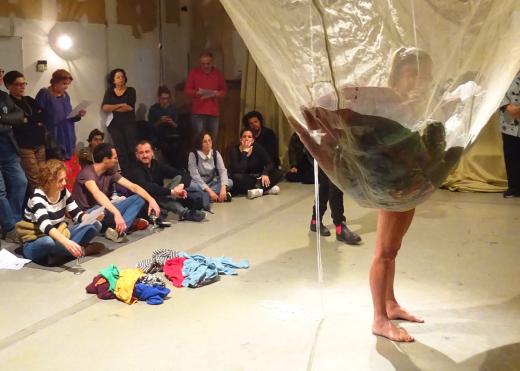How much I can w/bear - Tribute to Ann
I stand in the middle of a net of the olive harvest. The four ends of the net are pulled up by me with strings. The audience throws the clothes which are lying on the floor into the net and also adds own accessories. Some even take off their sweaters and throw them inside. When the net becomes so heavy that I can not hold it anymore, I hande over the ropes to my helpers. Then I slip out from under the net. I pull the clothes one by one through the hole in the net and sort them by color. The audience helps. I try out different garments.
Two weeks ago my boyfriend's mother passed away. During the Shivah, his younger brother and I wove pillows and rugs from their mother's clothes.
Ann was an elegant woman who had style. Looking through her clothes, I noticed that the clothes themselves were quiet simple and unspectacular.
I began to understand that the combining, wearing and presenting ones clothing, it's all about the attitude and taste, which emerges from the personality of the wearer.
Thanks to the open attitude of the family towards my artistic work, garments from Ann's belongings are part of this performance.
Used textile fabrics are lately the center of my installations, objects and performances.
The planning of my work is limited by the concept and by the use of the existing material.
I work according to the principle "no wastage" to produce art that protects the environment without using much energy and material resources.
Note:
Clothing is the fastest growing trash on the planet. By making cheap products, there are more clothes worldwide than can ever be worn by people no matter what social status.
Child labor and low wages, poor quality in materials and manufacturing facilitate mass production (=fast fashion). Companies such as H &M operate so-called greenwashing since only 1% of their clothes are really reused. Mixed textile materials are not reusable.
In countries such as Kenya, Tansania and other African countries, tons of so-called second-hand clothes coming from first world countries are being burned daily and causing extra enviromental pollution.
Two weeks ago my boyfriend's mother passed away. During the Shivah, his younger brother and I wove pillows and rugs from their mother's clothes.
Ann was an elegant woman who had style. Looking through her clothes, I noticed that the clothes themselves were quiet simple and unspectacular.
I began to understand that the combining, wearing and presenting ones clothing, it's all about the attitude and taste, which emerges from the personality of the wearer.
Thanks to the open attitude of the family towards my artistic work, garments from Ann's belongings are part of this performance.
Used textile fabrics are lately the center of my installations, objects and performances.
The planning of my work is limited by the concept and by the use of the existing material.
I work according to the principle "no wastage" to produce art that protects the environment without using much energy and material resources.
Note:
Clothing is the fastest growing trash on the planet. By making cheap products, there are more clothes worldwide than can ever be worn by people no matter what social status.
Child labor and low wages, poor quality in materials and manufacturing facilitate mass production (=fast fashion). Companies such as H &M operate so-called greenwashing since only 1% of their clothes are really reused. Mixed textile materials are not reusable.
In countries such as Kenya, Tansania and other African countries, tons of so-called second-hand clothes coming from first world countries are being burned daily and causing extra enviromental pollution.
December 2018
ZAZ Festival, Bamat Meizag
30 years Miklat 209
Tel Aviv | Israel
Assitants: Bevi Ben Shachar,
Pics: Fernando Rebeiro, Gadi Beilis
ZAZ Festival, Bamat Meizag
30 years Miklat 209
Tel Aviv | Israel
Assitants: Bevi Ben Shachar,
Pics: Fernando Rebeiro, Gadi Beilis















